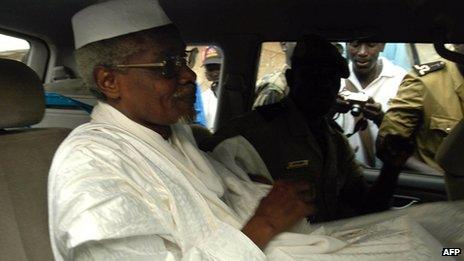Hissene Habre: Senegal and AU agree on special tribunal
- Published

Senegal and the African Union have signed an agreement to set up a special tribunal to try Chad's former leader Hissene Habre.
The 69 year old has been under house arrest since 2005 in Senegal, where he fled after being deposed.
He denies charges of killing and torturing tens of thousands of his opponents.
The charges date from 1982, when Mr Habre came to power in a coup, until he was ousted in 1990.
"Through the agreement, we are setting the procedure by which the trial should take place," said Senegal's Justice Minister Aminata Toure after signing the agreement with African Union representative Robert Dossou in the capital, Dakar.
The deal comes a month after the United Nations highest court, the International Court of Justice, passed a binding ruling that Senegal must begin proceedings to try Mr Habre "without further delay... if it does not extradite him".
Senegal has so far refused four extradition requests.
President Macky Sall, who came to power in March, had indicated that he would be willing to prosecute Mr Habre in a special tribunal.
Alioune Tine, president of the Dakar-based African Assembly for the Defense of Human Rights, said Senegal had moved "one step close to justice".
"We're counting on Senegal and the African Union to move quickly now and to begin Habre's trial before even more survivors die," he said, in a statement released by Human Rights Watch.
'Policy of terror'
Dubbed "Africa's Pinochet", Mr Habre was first indicted in Senegal in 2000 - but the country's courts ruled at the time that he could not be tried there.
His alleged victims then filed complaints under Belgium's universal jurisdiction law, which allows the country's judges to prosecute human rights offences committed anywhere in the world.
In 2005, he was charged by Belgium with crimes against humanity and torture.
There have been years of wrangling in Senegal over what to do about Mr Habre.
The government of former President Abdoulaye Wade changed its position on whether to try him several times - at one stage demanding international funding for a trial.
Last year, it unexpectedly announced that it would repatriate Mr Habre to Chad, where a court in 2008 sentenced him to death in absentia for planning to overthrow the government.
This plan was stopped following a plea from the UN, which feared he could be tortured on his return.
Mr Habre and his wife have kept a low profile in Dakar where he has lived in relative freedom, guarded by two security agents. He has occasionally been seen at a mosque for Friday prayers.
A 1992 Truth Commission in Chad accused Mr Habre of being responsible for widespread torture and the death of 40,000 people during his eight-year rule.
He was accused of carrying out a deliberate policy of terror to discourage any opposition.
Survivors of torture say that, among other things, they were subjected to electric shocks, near-asphyxia and "supplice des baguettes", when their heads were squeezed between sticks.
- Published30 May 2016
- Published27 March 2012
- Published12 May 2011